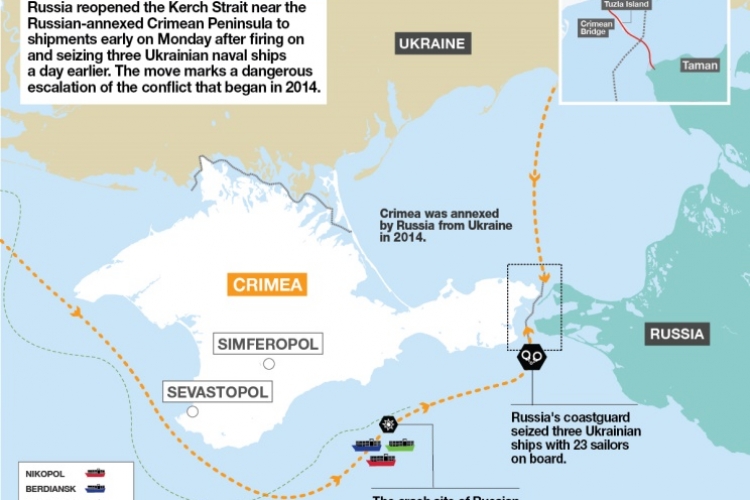RUSSIA – UKRANIAN ISSUE
IN NEWS
Ukrainian President Petro Poroshenko accused Russia’s Vladimir Putin of wanting to annex his entire country and called for NATO to deploy warships to a sea shared by the two nations. Russia seized three Ukrainian navy ships and their crews near the Crimean peninsula, which Moscow annexed in 2014, over what it said was their illegal entry into Russian waters — a charge Ukraine strongly refutes.
The Republic of Crimea, officially part of Ukraine, lies on a peninsula stretching out from the south of Ukraine between the Black Sea and the Sea of Azov. It is separated from Russia to the east by the narrow Kerch Strait.
SEA CLASH
As Ukraine points out that this seizure of vessels violated the 2003 agreement between the two nations on treating the Sea of Azov and the Kerch Strait as shared waters without any restrictions. But the Kremlin claimed that the Ukrainian ships entered Moscow's territorial waters without submitting the correct transit applications that Russia introduced in recent months to "ensure safe navigation".
As tension escalated, Ukrainian President Petro Poroshenko on Wednesday signed an act imposing martial law for 30 days in regions bordering Russia, the Black Sea and the Sea of Azov. Amid a threat of "full-scale war", Western governments have rallied behind Kiev, accusing Russia of illegally blocking access to the Sea of Azov and using force without justification.
UKRAINE –CRIMEA RELATION
Crimea was annexed by the Russian Empire during the reign of Catherine in 1783 and remained part of Russia until 1954, when it was transferred to Ukraine under the then Soviet leader Nikita Khrushchev.
After Ukrainian independence, political figures from the local Russian community sought to assert sovereignty and strengthen ties with Russia through a series of moves declared unconstitutional by the Ukrainian government. The 1996 Ukrainian constitution stipulated that Crimea would have autonomous republic status, but insisted that Crimean legislation must be in keeping with that of Ukraine. Crimea has its own parliament and government with powers over agriculture, public infrastructure and tourism.
UKRAINE-RUSSIA TENSION
The port of Sevastopol is a major naval base and has been home to the Black Sea Fleet since 1783. Following the collapse of the USSR, the fleet was divided up between Russia and Ukraine. The continuing presence of the Russian fleet in Sevastopol has been a focus of tension between Russia and Ukraine. In 2008, Ukraine - then under the pro-Western President Viktor Yushchenko - demanded that Moscow not use the Black Sea Fleet during the its conflict with Georgia. Both countries had agreed to allow the Russian fleet to stay until 2017, but after the election of the pro-Russian Viktor Yanukovych as president in 2010, Ukraine agreed to extend the lease by 25 years beyond 2017, in return for cheaper Russian gas.
EVALUATION OF THE CONFLICT
It is the most dangerous clash at sea off Crimea since Russia annexed the Ukrainian peninsula in 2014. The risk is that the conflict in eastern Ukraine could intensify. The pro-Russian separatists there have Russian heavy weapons, while Ukraine has received help from the West. They have been fighting since April 2014.Russia opened a bridge over the Kerch Strait this year, tightening its grip on Crimea.
Russia regularly inspects Ukrainian ships in the Sea of Azov, imposing extra costs on Ukraine. The area is vital to the Ukrainian economy - steel, grain and other goods pass through it. The clash underlines the risks in the disputed waters off Crimea, which is recognised internationally as Ukrainian. The Ukraine-Russia conflict has also widened religious schisms.
There has been renewed Western diplomatic pressure with the UN Security Council and NATO calling on Moscow and Kiev to de-escalate tensions. But the hardships from the economic sanctions since Crimea’s occupation have achieved little by way of confidence-building in the region. The geopolitical imperative of greater engagement with Moscow has never been more urgent, as hawks in the U.S. administration make no secret of their preference for confrontation over dialogue. The humanitarian situation arising from the continuing conflict brooks no delay in arriving at a speedy resolution.


 IAS -2025 Prelims Combined Mains Batch - III Starts - 14-04-2024
IAS -2025 Prelims Combined Mains Batch - III Starts - 14-04-2024